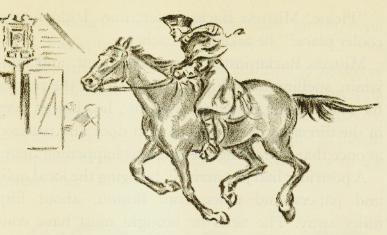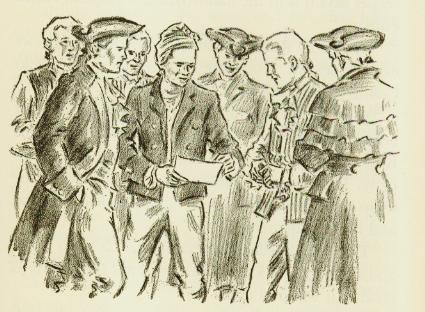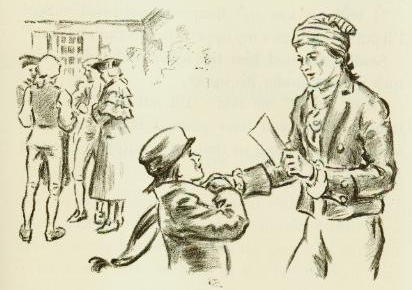
| [ The Life of Rufus Putnam ] | [ Florence Taylor's Poems ] | [ "When Mother Wrote a Column" ] | [ My Inspiration ] | [ Home ] |

For more than a year, Benjamin Stone had heard the people of Rutland talking about the Ohio Country and the men who had gone westward, but he had not been much interested. Not until General Putnam's letter arrived did he realize that he, too, might one day be leaving Massachusetts and following the wagon trail over the mountains to the West.
It was a day in early February, 1789, when the important letter arrived. Benjamin had spent the morning studying his spelling lesson on a bench close to the open fireplace in the little Rutland school. At last the heat of the fire began to grow unbearable.
"Please, Mistress Buckminster, may I move to a cooler place?" he asked his teacher.
Mistress Buckminster gave her consent, and Benjamin, spelling book in hand, started for the rear of the room. As he passed the window, be glanced over in the direction of the tavern next door and realized at once that something exciting was happening there.

A post rider had just arrived, bringing the local mail and papers and news from Boston, about fifty miles away. The news he brought must have concerned the whole village, for men were coming from all directions to gather around him at the inn door.
The storekeeper had left his store, and the cobbler had left his shop. The blacksmith had come in such haste that he had not even taken time to remove his leather apron. Even the village doctor was there.
To his surprise, Benjamin saw, that the center of attention was his oldest brother, Sardine, and not the postrider at all. Sardine was standing between the storekeeper and the tavern keeper, and in his hand was something which looked like a piece of white paper.
Benjamin's exclamation at the sight of Sardine attracted the attention of Mistress Buckminster. She was on the point of ordering him to his seat when her eye fell upon the hourglass. The last grains of sand were running through it, and the time for the noon recess was at hand.
Benjamin was the first of the children to be out of the schoolhouse. He snatched his cap and his long knitted tippet with one hand, and with the other he caught up the leather pouch which held his lunch. Down the steps he raced and across the snow to the tavern yard.

As he drew nearer, he could hear scraps of conversation, and the words General Putnam, Israel Stone, and Ohio, repeated again and again. Israel Stone!
That was the name of Benjamin's father! What had Israel Stone to do with General Putnam and the Ohio Country?
Sardine saw his younger brother crossing the courtyard and hastened to meet him. Benjamin could see now that the carefully folded paper was a letter, and that it was sealed with a large daub of red sealing wax.
"It is a letter for Father," said Sardine. "The tavern keeper says it is in the handwriting of General Rufus Putnam."
"If it is from Rufus Putnam, it will bring more news from westward, from the settlement in the Ohio Country," said the blacksmith.
"Many a man here in Rutland is waiting for that news," said the tavern keeper.
"It is two years since Rufus Putnam helped to organize the Ohio Company. They bought a great tract of land north of the Ohio River and promised Congress to clear the land and build settlements there."
"Two years!" echoed the cobbler. "It's two years, and still we don't know whether or not the land is as good as it was said to be!"
"But after all, it is only one year since General Putnam and his party of settlers left Massachusetts for the Ohio Country," said Sardine. "One year is not much time for a task of that kind. We know that one successful settlement has been made. Mrs. Putnam has often heard from her husband, and his encouraging report was published last summer in The Massachusetts Spy.
"That's right," the cobbler admitted. "There is the settlement at Marietta, named for Marie Antoinette because of the help France gave to the American Colonies during the Revolutionary War. It must be from Marietta that the letter for your father has come."
Sardine looked at the worn and battered letter which he was holding. What a long, long way it had come! He wondered through how many hands it had passed. What news would it bring from the little settlement on the Ohio? He examined the letter once more and then a look of perplexity crossed his face.
"If this is news from Marietta," he said, "how does it happen that the letter was posted at Hartford, in Connecticut?"
Joel Oakes, a young man from one of the neighboring farms, peered over Sardine's shoulder to see for himself what was written across the face of the letter. "Look down there in the corner!" he said. "It says, 'Favored by Col. Sproat.' There is no postrider mail service between the Ohio Country and Pittsburgh. Letters have to be sent East in the care of anyone who happens to be traveling this way. Colonel Sproat probably was coming to visit his family in Providence. He must have carried the letter as far as Hartford and posted it there."
"You are right, Joel. That's just what happened," said the tavern keeper.
"And I'm telling you," Joel went on, "that if General Putnam's report about the country is as favorable today as it was a year ago, I shall pack up and travel to Ohio myself!"
"I, too!" and "So shall I!" came a chorus of voices from the men in the courtyard.
"It is too difficult to make a living on these old, worn-out fields," said another farmer, who had just joined the group. "The state takes more in taxes than we can make on our crops in a whole year!"
The others grumbled their agreement. There had been hard times in Rutland ever since the close of the Revolution, five years before. There was scarcity of money and of everything else. Many of the men felt that moving to the Ohio Country was the best solution for their problems, and all were anxious to know what General Putnam had written.
Benjamin was not interested in the men's talk, but he was interested in the letter.
"Aren't you going to read it, Sardine?" he inquired anxiously.
"Of course not!" his brother answered. "General Putnam sealed it, and Father must be the one to break the seal. We shall have to wait until tonight when Father comes home from the woodlot."

"It is only two miles to the woodlot," he said thoughtfully. "You might get lost!"
"You are too busy to go, Sardine, but I could take the letter to Father."
Benjamin remembered that Father had hitched Pete to the log sled and gone to the. woodlot to cut his share of the wood for the school.
"Pooh!" said Benjamin. "I know the way to the lot and I can follow the tracks of the sled to the place where Father is at work. Anyhow, Father has Flora with him. If I whistle, she will come running and she can take me to Father."
Sardine still hesitated. "You might lose the letter," he said. "It has traveled safely for eight hundred miles. We'd hate to lose it on the way to the woodlot."
"I will not lose it," Benjamin promised. "See! I'll put it here under my tippet where it can't fall out."
Sardine handed him the letter and helped him tuck it away under his tippet.
"Run along!" he said. "I'll tell Mistress Buckminster where you have gone. I hope that you'll soon be back to tell us that we are to join General Putnam in Ohio."
Chapter 2 Through the Snowy Woods